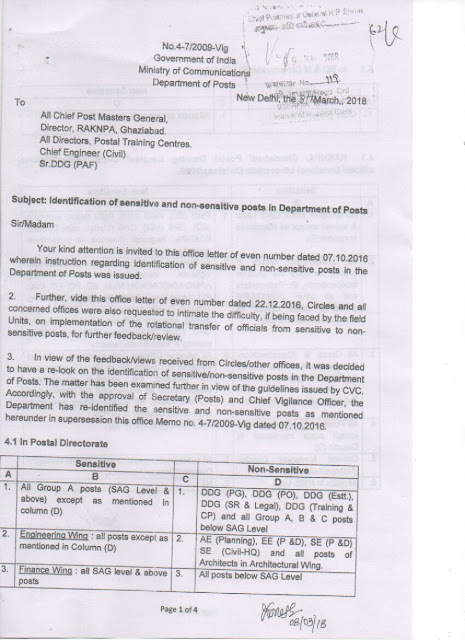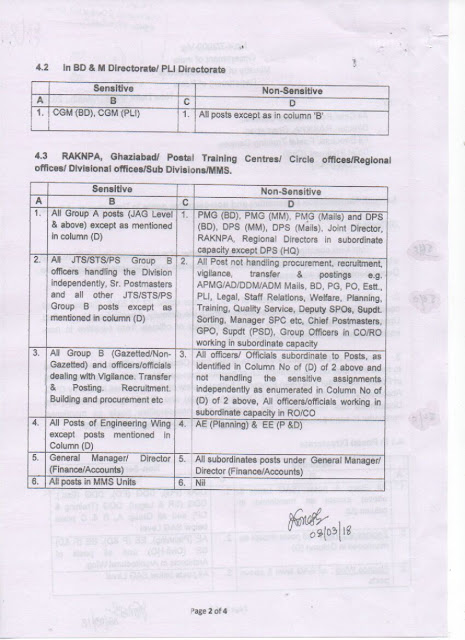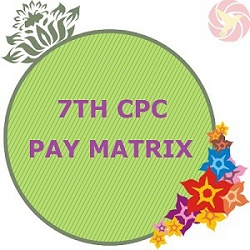Showing posts with label DOP Orders. Show all posts
Showing posts with label DOP Orders. Show all posts
Monday, 23 September 2019
Saturday, 24 March 2018
Thursday, 22 March 2018
Tuesday, 20 March 2018
Monday, 19 March 2018
Friday, 16 March 2018
Saturday, 11 November 2017
Thursday, 27 April 2017
Saturday, 8 April 2017
Wednesday, 29 March 2017
Thursday, 8 December 2016
Wednesday, 14 September 2016
Postal complaints in the country will be solved within 24 hours- Sinha
Postal complaints in the country will be solved within 24 hours- Sinha
Press Information Bureau
Government of India
Ministry of Communications & Information Technology
12-September-2016 14:12 IST
Postal complaints in the country will be solved within 24 hours- Sinha
Manoj Sinha launches India Post Help Centre and a Toll Free Number 1924
Ministry of Communications today launched India Post Help Centre and a Toll Free Number 1924 to address the grievances of people in the Country related to Department of Posts. Inaugurating the Help Centre here, Minister of Communications, Shri Manoj Sinha said that the move comes in the wake of Prime Minister Shri Narendra Modi’s PRAGATI (Pro-Active Governance And Timely Implementation) review meetings, where he exhorts the Union Ministers to actively address the grievances of the common man by setting up and strengthening Public Redressal Grievances Mechanism.
Shri Sinha said that the Help Centre has been launched in three languages -Hindi, English and Malayalam and gradually all regional languages will be included which are mentioned in the Schedule of the Indian Constitution.
He said, the Help Centre will be functioning from 8 A.M to 8 P.M on all working days except holidays. Shri Sinha said that soon, in every circle a nodal officer will be appointed to bring efficiency in redressal mechanism.
The Minister stressed that except in the case of policy decisions, all complaints related to postal services will be addressed within 24 Hours. Shri Sinha recalled that last month he had launched “Twitter Sewa” for addressing the complaints and concerns of common man and other stake-holders in the telecom and postal sectors, where on an average 100 complaints are received daily related to postal services. He said, the Department of Posts is one of the 8th largest Department/Ministry in terms of numbers of complaints received. A toll free helpline number ‘1924’ would be available for customers from all over India from landline/mobile phone of service providers namely AirTel, Idea, Vodaphone, Telenor, Aircel, MTS, Reliance etc.
The complaints received from the complainant on toll free number ‘1924’ would be registered in Computerized Customer Centre (CCC) Portal by the operators at the Dak Bhawan and the 11 digits ticket number would be provided to the complainants. If the complaint already registered, the complainant would be informed the status as viewed in CCC Portal. As soon as the complaint is generated on CCC Portal, the concerned post office will take immediate necessary action to resolve it and would upload the status.
Saturday, 10 September 2016
GUIDELINES FOR TOLL FREE CENTRE AT DAK BHAWAN, NEW DELHI FOR HANDLING OF PUBLIC GRIEVANCES.
GUIDELINES FOR TOLL FREE CENTRE AT DAK BHAWAN, NEW DELHI FOR HANDLING OF PUBLIC GRIEVANCES.
1. The toll free helpline number ‘1924’ would be available for customers from all over India from landline/mobile phone of any service providers.
2. The name of centre would be “India Post Help Centre” and it would be located in Dak Bhawan, New Delhi.
3. The toll free helpline service would be available on all days from 8:00 A.M. to 8:00 P.M. (excluding declared holidays & Sundays).
4. The complaints received from the complainant on toll free number ‘1924’ would be registered in Computerized Customer Centre (CCC) Portal by the operators at the Dak Bhawan and the 11 digits number would be provided to the complainants.
5. If the complaint already registered, the complainant would be informed the status as viewed in CCC Portal.
6. As soon as the complaint is generated on CCC Portal, the concerned post office will take immediate necessary action to resolve it and would upload the status.
7. All the Postal Circles would establish a Control Room and depute suitable competent or Senior Officers/Team of Officers for monitoring and redressal of complaints.
8. The Nodal Officer in each Circle will open the CCC Portal every day and check all the complaints beginning with “100030 - …… the Toll Free Complaints” and will examine for quick disposal.
9. The Circle Heads would direct to all the Post Offices to ensure that they log in CCC Portal at the beginning of day and at the end of the day compulsorily.
10. The case disposal time is one working day subject to policy matters. The complainant would be informed, if it involves policy matter.
11. The reasonable reply should be uploaded in the CCC Portal.
12. Circle will update the status of each such cases every 24 hrs. through email onadgpg@indiapost.gov.in.
13. The name of Officers with email address and mobile number in each Circle who will be Nodal Officer, should be sent on emailadgpg@indiapost.gov.in
14. CPMG should review the ‘1924’ pending cases every day and in case of pendency going beyond 24 hours would give full details and convey his/her observation to PG Cell of Directorate which will provide weekly report to the Secretary (Posts).
15. Circles would provide utmost priority and quick disposal of the complaints received through Toll Free Centre.
16. All the Circles would propagate and give wide publicity of “Toll Free Number 1924” within their jurisdiction through appropriate medium within budgetary limit after inauguration of India Post Help Centre by Hon’ble Minister of Communications.
Friday, 2 September 2016
DPC FOR PROMOTION TO THE POSTAL SERVICE GROUP 'B' CADRE FOR THE VACANCY YEAR 2016-2017
DPC FOR PROMOTION TO THE POSTAL SERVICE GROUP 'B' CADRE FOR THE VACANCY YEAR 2016-2017
DOWNLOAD ORIGINAL ORDER
DOWNLOAD ORIGINAL ORDER
Monday, 8 August 2016
PASSWORD POLICY - SETTING COMPLEX PASSWORDS - REG
DoP Password Policy V.1.0
1. Purpose: The purpose
of this policy is to establish a standard for creation of strong passwords, the
protection of those passwords, and the frequency of change of the passwords.
2. Scope: The scope of
this policy includes all end-users of DoP email services and personnel who have
or are responsible for an account (or any form of access that supports or
requires a password) on any system/ service in the India Post domain. These
include personnel with their designated desktop systems/ laptops. The scope
also includes designers and developers of individual applications.
3. Policy:
3.1 Policy Statements:
3.1.1 For users having accounts for
accessing systems/ services:
3.1.1.1 Users shall be responsible for all activity
performed with their personal user Ids. Users shall not permit others to
perform any activity with their user Ids or perform any act ivity with Ids
belonging to other users.
3.1.1.2 All user-level passwords (e.g. email, web,
desktop computer etc.) shall be changed periodically. Presently the email
password expiry period is configured as 90 days. Similar expiry limit will be
imposed on other applications in future. The IA of the respective application
will suitably notify to the users about expiry of the password well in advance.
In such case the users are required to change the password. Users shall not be
able to reuse previous passwords.
3.1.1.3 The password expiry period is subject to revision
by the competent authority.
3.1.1.4 For Password Change Control, both the old and new
passwords are required to be given whenever a password change is required.
3.1.1.5 Passwords shall not be stored in readable form in
batch files, automatic logon scripts, Internet browsers or related data
communication software, in computers without access control, or in any other
location where unauthorized persons might discover or use them.
3.1.1.6 All access codes including user ID passwords,
network passwords, PINs etc. shall be treated as sensitive and confidential
information and not be shared with anyone, including personal assistants or
secretaries.
3.1.1.7 All PINs (Personal Identification ion Numbers)
shall be constructed with the same rules that apply to fixed passwords.
3.1.1.8 Passwords must not be communicated through email
messages or other forms of electronic communication such as phone to anyone.
3.1.1.9 Passwords shall not be revealed on questionnaires
or security forms.
3.1.1.10 Passwords of personal accounts should not be revealed to the
controlling officer or any co-worker even while on vacation unless permitted to
do so by designated authority.
3.1.1.11 The same password shall not be used for each of the
systems / applications to which an user has been granted access e.g. separate
password to be used for a Windows account and an UNIX account .
3.1.1.12 The "Remember Password" feature of
browser/applications shall not be used.
3.1.1.13 Users shall refuse all offers by software to place a
cookies on their computer such that they can automatically log on the next time
when they visit a particular Internet site.
3.1.1.14 First time login to systems / services with administrator
created passwords, should force changing of password by the user.
3.1.1.15 If the password is shared with support personnel for resolving
problems relating to any service, it shall be changed immediately after the
support session.
3.1.1.16 The password shall be changed immediately if the
password is suspected of being disclosed or known to have been disclosed to an
unauthorized party.
3.1.1.17 Users must not be able to reuse their last 5 passwords
when choosing a new password.
3.1.1.18 Users must be locked out for next 30 minutes after 5
successive failed logon attempts due to incorrect user id/password.
3.1.1.19 Password should comply with the standards as specified
in Para 3.2.
3.1.2 For designers/developers of
applications / sites:
3.1.2.1 No password shall be traveling in clear text; the
hashed form of the password should be used. To get around the possibility of
replay of the hashed password, it shall be used along with a randomization
parameter.
3.1.2.2 The backend database shall store hash of the individual
passwords and never passwords in readable form.
3.1.2.3 Password should comply with the standards as
specified in Para 3.2.
3.1.2.4 Users shall be required to change their password
periodically and not be able to reuse last 05 passwords.
3.1.2.5 For Password Change Control, both the old and new
passwords are required to be given whenever a password change is required.
3.2 Policy for constructing a password: All user-level and system-level
passwords must conform to the following general guidelines described below:
3.2.1 The password shall contain more
than eight characters.
3.2.2 The password shall be a combination
of upper and lower case characters (e.g. a-z, A-Z), digits (e.g. 0-9) and
punctuation characters as well and other characters (e.g., !@# $%^ &* ()_+
| ~ -= \ ` { } [ ] :"; '< > ?,./ ).
3.2.3 The password shall not be a word
found in a dictionary (English or foreign).
3.2.4 The password shall never be the
same as the Login Id / User Name as well as not be a derivative of the user ID,
e.g. < username> 123. I t should also not contain the user's account name
or parts of the user's full name that exceed two consecutive characters.
3.2.5 The password shall not be a
slang, dialect, jargon etc.
3.2.6 The password shall not be a
common usage word such as names of family, pets, friends, co-workers, fantasy
characters etc.
3.2.7 The password shall not be based
on computer terms and names, commands, sites, companies, hardware and software.
3.2.8 The password shall not be based
on birthdays and other personal information such as addresses and phone
numbers.
3.2.9 The password shall not be a word
or number pattern like aaabbb, qwerty, zyxwvuts, 123321 etc. or any of the
above spelled backwards.
3.2.10 The password shall not be any of the above
preceded or followed by a digit (e.g., secret1, 1secret ).
3.2.11 Passwords shall not be such that they
combine a set of characters that do not change with a set of characters that
predictably change.
3.3 Suggestions for choosing passwords: Passwords may be chosen such that
they are difficult-to-guess yet easy-to-remember. Methods such as the following
may be employed:
3.3.1 String together several words to
form a pass-phrase as a password.
3.3.2 Transform a regular word
according to a specific method e.g. making every other letter a number reflecting
its position in the word.
3.3.3 Combine punctuation and/or
numbers with a regular word.
3.3.4 Create acronyms from words in a
song, a poem or any other known sequence of words.
3.3.5 Bump characters in a word a
certain number of letters up or down the alphabet.
3.3.6 Shift a word up, down, left or
right one row on the keyboard.
4 Responsibilities:
4.1 All individual users having accounts for accessing systems/
services in the India Post domain and system/network administrators of DoP
servers/network equipments shall ensure implementation of and compliance to
this policy.
4.2 All designers/developers responsible for site/application
development shall ensure the incorporation of this policy in the authentication
modules, registration modules, password change modules or any other similar
modules in their applications.
5 Compliance:
5.1 Personnel authorized as Internal Audit shall periodically review
the adequacy of such controls and their compliance.
5.2 Personnel authorized as Application Audit shall check respective
applications for password complexity and password policy incorporation.
Friday, 29 July 2016
Willingness of Accountant for posting on deputation in the PTC Darbhanga, Bihar
Willingness of Accountant for posting on deputation in the PTC Darbhanga, Bihar






































